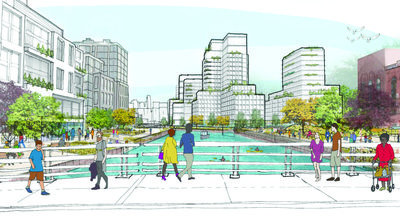On Thursday June 24, Community Boards 6 and 2 voted to approve the proposed Gowanus rezoning by a margin of 26 votes in favor and 6 opposed, with 2 abstaining board members.
The hearing comes on the heels of a months-long controversy surrounding the rezoning of a large majority of Gowanus. The land-use proposal was originally conceived by ex-Mayor Bloomberg but has found new life under Mayor de Blasio. It would see 80 square blocks of the neighborhood rezoned to make way for new developments, including the controversial plan to build a complex on the highly polluted “Public Place” site along the Gowanus Canal.
Community groups including Voice of Gowanus have constantly fought against the rezoning. Their criticism was directed at both the legal process to approve the rezoning and the environmental risks that could come along with new development.
The group successfully secured a temporary restraining order that prevented the rezoning from entering the land-use review process. However, New York Supreme Court Justice Katherine Levine ruled to allow the city to continue with the public review process so long as an in-person hearing option was offered for those without internet access.
Earlier in the month, Community Boards 6 and 2 held a hybrid public hearing with virtual and in-person components to gather community feedback about the rezoning. Last week, the Community Boards reviewed the feedback and voted in favor of a conditional approval.
Additionally, the Boards created a 14 page document with community-enhancing conditions that they deemed necessary for the approval. These include (but are not limited to) increased capital investment for NYCHA development, a commitment to long-term community oversight, a full EPA review of contaminated sites, an expansion of the Gowanus Industrial Business Zone (IBZ), and a restoration of the B71 bus routes.
Special attention was paid to the issue of affordable housing. The Board’s document requests that 20 percent of the available units be put aside for households making 40 percent of the Area Median Income (AMI, a measure used throughout the city to determine affordability) and 25 percent of units for households making 60 percent of the AMI.
These rates are lower than those required under Mandatory Inclusionary Housing (MIH), the de Blasio administration’s affordable housing program. MIH has been sharply criticized by many politicians and activists who blame the program for expediting displacement and gentrification in working-class neighborhoods throughout the city.
Many of the Board’s conditions are in-line with the community feedback gathered at the public hearing.
“I thought there was very, very insightful testimony that informed our committee’s deliberation, and really moving testimony,” Alec Schierenbeck, the Community Board 6 Land Use Committee chair, said at the meeting.
He continued: “From people who’ve lived in our neighborhood for decades, people who wished they could live in our neighborhood if they could afford it. People who are concerned about environmental degradation that’s happened for decades which has necessitated all kinds of changes in the zoning code, try to improve the state of affairs, and want real EPA oversight. And I think that those voices were reflected in the resolution.”
Gowanus City Council Member and the current leader in the Democratic Comptroller race Brad Lander expressed his satisfaction with the deal as well. However, with a new City Council heading to office this fall it is yet to be seen if support for the Gowanus Rezoning will continue. The current leaders in the race for District 39 (which encompasses Gowanus), Shahana Hanif and Brandon West, both told our paper that they supported the project so long as it maintained a commitment to affordability and environmental safety.
In order to ensure accountability, the Community Boards have requested that the city support and fund a Gowanus Zoning Commitment Task Force.
“The Task Force will monitor compliance with public and private commitments, adherence to zoning requirements, and implementation of the Rezoning,” the Community Boards wrote in their list of conditions. “With representation from local organizations, city agencies, and stakeholders, the Task Force will receive quarterly updates from the city and other stakeholders on planning, implementation, and successful completion of commitments, and disseminate this information to the community in a transparent and accessible manner.”



